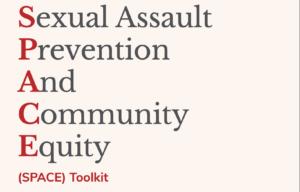SPACE: A New Toolkit from the Authors of Sexual Citizens
The authors of Sexual Citizens: A Landmark Study of Sex, Power and Assault on Campus have released a new toolkit geared toward equipping college campuses with innovative tools and guidance to transform physical and communal environments that contribute to sexual violence. SPACE, which stands for Sexual Assault Prevention And Community Equity, builds off of the insights established in Sexual Citizens to provide a practical framework for prevention practitioners on college campuses to engage administration, stakeholders and students in developing a plan to advance campus equity by addressing residential and social spaces.

PreventConnect sat down with co-authors of Sexual Citizens, Jennifer S. Hirsch and Shamus Khan, to discuss their research on how violence and prevention occur throughout the social ecology and how campuses can change physical environments to be more conducive to sexual violence prevention. A recording of that web conference can be found here.
In SPACE, Hirsch and Kahan, along with co-creators Kathy Leichter and Alexandra Zeitz-Moskin, expand on the concept of physical environments as sexual violence prevention by offering a four-phased toolkit for campus transformation.
Phase 1. Commit: Where prevention practitioners seek buy-in and support from senior level administrators and make specific institutional asks.
Phase 2. Convene: Where prevention practitioners bring people with diverse experiences and power across the campus community to form a task force.
Phase 3. Consider: Where prevention practitioners help the task force and broader community understand the “sexual geography” of their campus.
Phase 4. Change: Where prevention practitioners work with the task force to generate campus changes to advance equity.
In addition to a framework that can be adapted to meet diverse campus structures and environments, the toolkit offers implementation tips and guides for practitioners, ranging from sample work plans and timelines to tips on convening and implementing SPACE to guides on how to map sexual geographies.
SPACE aims to be intentional in its commitment to equity, investing in process rather than immediate outcome and engaging whole campus communities in implementation and evaluations.
Hirsch and Kahan will be hosting a webinar on how to use the SPACE Toolkit April 26th at 2:30 p.m. EST. 11:30 a.m. PST. Attendance is free and open to anyone interested in implementing SPACE. The link to register can be found here.
The complete toolkit is available as a free resource here.
Sexual Citizens has been realized as part of Columbia’s Sexual Health Initiative to Foster Transformation, SHIFT.
